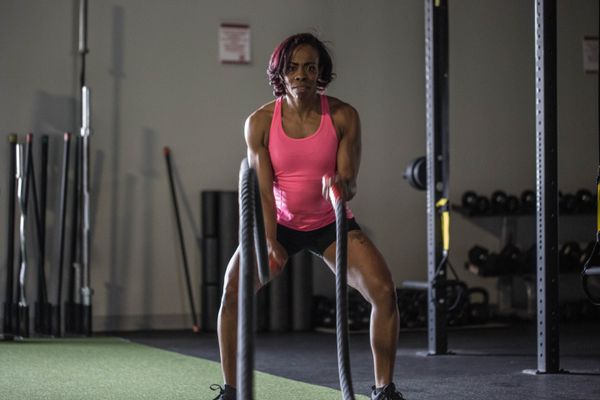It seems like the only thing I do these days is scroll through social media in a desperate attempt to gain information. My phone has called me out on my screen time more than once, and I just continue to ignore it. You're probably in the same boat — stuck at home, scrolling deeper and deeper into a hole of conspiracy theories and possible "back to normalcy" dates, hungry for information.
While we know that the news is not our mental health's friend these days, getting reliable information is helpful and necessary.
While the rest of us are home on our phones, healthcare workers are on the coronavirus (COVID-19) front line every single day. They see what we read snippets of, quickly gaining the perspective that we couldn't fathom. That's why we're going to the root of the information — these healthcare workers who put their own safety at risk every single day.
Today, I sat down (virtually) with a neurosurgery nurse in Fort Worth, Texas.
How long have you been a nurse?
In July, I'll have been a nurse for two years.
What department do you work in?
I work on a neurosurgery and epilepsy monitoring unit (EMU). We see kiddos with meningitis, new brain tumor diagnoses, hydrocephalus, any neurosurgery, migraines, head injuries, new diagnoses of epilepsy, rule out seizures and a lot more. We have kids be admitted to the EMU to classify their seizures, help with treatments of seizures, and monitor seizure activity to aid in guiding treatment.
What is your hospital's procedure in regard to COVID-19 patient care?
Our current procedure is every staff member needs to wear a hospital mask at all times and we have temperature stations to get our temp check before coming into work. Parents need to wear a mask while staff is in their room or whenever they are out of their room — children over the age of two need to wear a mask if they are able to. We are also testing kids going to surgery that need to intubated and that are admitted from the ER with asthma exacerbation, fever, and rule out sepsis. We are only allowing one visitor per patient at a time.
What is protocol if you (or another nurse) shows signs of infection?
If we are not feeling well before coming into work or showing signs of infection, we are asked to not come to work and take our temperature. If we're not feeling well at work, we're sent home.
Do you have enough PPE?
Our hospital has been really lucky to still have a good supply of PPE. We do have reusable gowns if we need them, and at one point we were encouraged to keep our N-95 for reuse if we used one. During the start of all this, we were low on hand sanitizer but were given some from our community. We have also been really blessed with mask donations, too, not only for staff but for families to get upon admission to our medical center.
What's the biggest change your day-to-day has faced because of COVID-19?
My biggest change at work has been the constantly changing guidelines and recommendations from the CDC — it almost feels like you're never going to know if the next day will have the same rules. It gets confusing to know if the same procedures we had last week at work are still in play or if there are new things we need to be doing.
When it comes to the care that I provide to my kids, the biggest challenge has been the one visitor policy. It's been hard not only on staff to limit the visitors but seeing how it affects the families and patients that would love to have both parents (and all their family) there with them during their hospital stay has been hard. You can see the struggle with not having their support system with them.
It's also hard to wear a mask all the time. For kids, being in the hospital is scary enough but being around all these people with their faces covered is even scarier. It's hard to not have the ability to smile at the parents and patient, to make them feel like they are safe.
What is one word that describes your hospital's atmosphere?
The first word that comes to mind is QUIET. In healthcare, we don't like using that word for many reasons, but as a children's hospital, we are known for the bright colors, fun and friendly faces and atmosphere that fosters an environment that is meant to make children smile and feel happy and safe — despite being in the hospital. Now there aren't a whole lot of visitors walking the halls, there are no volunteers, no fun activities for the patients and just the overall atmosphere is quiet. There's not a whole lot of foot traffic besides solo loved ones coming to visit.
How do you feel about the national news coverage of COVID-19? Accurate? Downplaying the situation?
I have mixed emotions about this question. I will say I feel like the news has been accurate, but you definitely have a different perspective when working in healthcare.
What is one thing you wish you could tell the country about COVID-19?
This virus is not a joke and it's not just like the flu. Take the recommendations of social distancing, washing your hands, and wearing your face masks seriously. In Texas, things have started to slowly open back up — even though things are opening we still need to be careful and wash our hands as often as possible. It's not just about protecting yourself, it's about protecting those around you that you may come in contact with.
How is your personal life impacted by COVID-19?
My family all live in New Mexico and Arizona, so I haven't been able to see them and that's been really hard. But we have had lots of facetime calls and phone calls. My personal life has been up and down — I am lucky that a lot of my friends are nurses and we work at the same hospital so I can still see them at work, but I am excited to have the chance to see them outside of work and catch up.
It's nice to have a support system that knows exactly what I am going through. I also think one of the hardest things is coming home from work and just hoping and praying that I don't bring anything home from the hospital that may get my boyfriend or roommate sick.
Are there any stories of hope you can share with us?
While I was in college, I spent three years nannying for a family. Throughout quarantine, the mom and dad have been making masks — one day I got a package of masks not only for me but for nurses on my unit. It was so sweet and definitely brightened everyone's day!
What advice can you give us for staying as healthy as possible?
Wash your hands, stay hydrated and take lots of vitamin C and zinc!
What can citizens in your area do to help healthcare workers fight COVID-19?
Be patient, stay home and wash your hands!!!
If you are a healthcare professional interested in sharing your story, please email lily.moe@theodysseyonline.com.
Shop our nurse gift guide to treat the healthcare worker in your life!
As an Amazon Affiliate partner, Odyssey may earn a portion of qualifying sales.






















